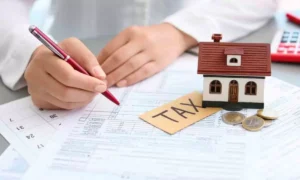The Texas state legislature recently passed some new laws that will change property taxes starting in 2024. These laws are meant to give homeowners a break and make property taxes lower.
What Is The New Property Tax Law In Texas 2024?
The main things that will be different in 2025 are:
- Homeowners will get to take off more money from their home’s value when calculating taxes. Before it was $25,000, now it will be $40,000. This means your taxable value and taxes will be lower.
- School taxes, which are a big part of property taxes, will go down a little bit. This will save most homeowners around $80 per year.
- More people can take part in a program that limits how much your home’s taxable value can increase each year, even if your home goes up in real value a lot. Before it was only for people over 65, now anyone over 55 can join.
Further Homestead Exemption Increase
Texas has long provided a homestead exemption for owner-occupied primary residences to help lower property tax bills for homeowners. As of 2023, the state homestead exemption amount is $25,000. Under the newly passed legislation, this will increase to $40,000 starting in tax year 2024.
This substantial bump in the homestead exemption amount means that much of the value of homestead property will be shielded from property taxes. For the typical home, this could translate to several hundred dollars in annual tax savings.
| Tax Year | Homestead Exemption Amount | Taxable Value | Estimated Taxes |
| 2023 | $25,000 | $225,000 | $3,375 |
| 2024 | $40,000 | $210,000 | $3,150 |
The homeowner would save roughly $225 on their 2024 property tax bill simply due to the increased homestead exemption. This benefit would be realized each year going forward as long as the homeowner retains the homestead designation on the property.
School Tax Decrease
In addition to boosting the homestead exemption, the new property tax law reduces school district maintenance and operations (M&O) property tax rates by one-third of a cent per $100 of property value.
For the median-valued home in Texas of around $243,000 in 2021 with the average school tax rate of $1.37, this -0.0033 reduction in school M&O tax rates would save the typical homeowner approximately $81 per year.
Appraisal Cap Program
The Texas legislature also expanded the eligibility requirements for the state’s property tax appraisal cap program. The appraisal cap, formally known as the homestead property tax limitation, limits the amount a home’s taxable value can increase each year, regardless of the actual market appreciation in the home’s value.
Previously, to qualify for the appraisal cap program a homeowner had to be 65 years or older or disabled. Under the new law, starting in tax year 2024 the eligibility age decreases to 55 years old.
Homeowners who are 55 years of age or older at the time they apply will now qualify for the 10% appraisal cap on their primary residence indefinitely going forward, provided they continue using the property as their homestead.
For eligible homeowners whose property values have risen rapidly in recent years, the appraisal cap can provide considerable ongoing annual tax relief by slowing the growth of their taxable home value over time. This program expansion will bring those benefits to more Texas homeowners approaching retirement.
Additional Property Tax Law Updates
A few other changes enacted in the new property tax legislation include:
- Extending tax deferrals for disabled veterans and their surviving spouses. This allows eligible individuals additional years to defer paying property taxes without interest or penalties.
- Creating the Essential Caregiver Property Tax Exemption. Primary family caregivers of an elderly or disabled individual may now claim a tax exemption of up to $5,000 of the property’s value if certain criteria are met.
- Temporarily increasing the limitation on taxes imposed for indigent health care from $.0825 per $100 to $0.10 per $100 of a property’s value for the 2024 and 2025 tax years.
- Limiting appraisal district budget increases to no greater than 3.5% annually through 2026, with provisions to require voter approval for any higher budgets.
Protesting Your Taxes: Your Path To Potential Further Savings
Even with the beneficial reforms contained in the new Texas property tax law, some homeowners may still feel their valuations or tax amounts are inaccurate or excessive. The good news is Texas offers taxpayers the right to formally protest appraisals and tax determinations.
The process begins by filing a notice of protest with the local appraisal review board before the deadline. Which is typically in mid-May or sometime in June. Taxpayers can make their case to the board that their property’s market value, exemptions, or other factors like equitable appraisal were improperly determined.
When protesting a home’s value, it’s important to provide recent comparable sales data for similar properties to help support an argued valuation. Photos or documentation of quality/condition issues can also aid that defense.
For exemption or other protests, thoroughly understand qualifications and bring necessary supporting documents. Be sure to review the appraisal district’s evidence as well. Appraisal review boards will consider both sides fairly.
If still unsatisfied after the initial protest hearing, taxpayers can take their case to the state district court. While this requires additional legal action and costs, it offers an appeal option should solid evidence indeed prove an improper appraisal was levied.
Taking the time to research protest rights and utilizing the appraisal review process can potentially yield substantial savings on top of benefits from the new statewide tax laws. Proactive taxpayers see it as a valuable investment of effort.
Conclusion
The combination of Texas’ boosted homestead exemption, decreased school property tax rates, expanded appraisal cap eligibility, and additional tax relief measures within the new property. Tax law means that many Lone Star State homeowners are very likely to see reductions on upcoming 2024 tax bills. The average savings could easily reach several hundred dollars or more for the typical homeowner.
By granting these strategic reforms, legislators have demonstrated their commitment to controlling skyrocketing residential property appraisals and taxes. That has squeezed household budgets in recent inflationary times. Taxpayers now have more assistance defending reasonable valuations as well through expanded protest opportunities.
Frequently Asked Questions
The major forms of property tax relief in the new 2025 Texas legislation include increasing the homestead exemption amount, decreasing school district tax rates, and expanding eligibility for the appraisal cap program.
Starting in tax year 2025, the Texas homestead exemption amount will increase from $25,000 to $40,000 of a home’s value that is shielded from property taxes.
There is no specific age where property taxes are no longer owed in Texas. However, homeowners 65+ qualify for added exemptions, and the age to qualify for the appraisal limitation was lowered to 55 starting in 2025.
In addition to exemptions for the elderly/disabled and certain vets, other exemptions may apply based on ownership type (non-profits, government, etc.), and home improvements. If the property is being used for specific purposes like agriculture or historic preservation.










